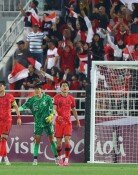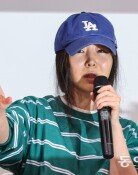Rest in peace, former President Kim Young-sam
Rest in peace, former President Kim Young-sam
Posted November. 23, 2015 08:49,
Former President Kim Young-sam who took the initiative in bringing democracy to Korea and fighting corruption died on Sunday at the age of 87. The great politician who led the pro-democracy movement with late former President Kim Dae-jung is no longer with us. While industrialization was driven by former President Park Chung-hees leadership, democratization was on the back of the struggles and leadership of the two Kims and Cardinal Kim Sou-hwan.
Mr. Kim neither was intimidated nor gave in to the threats of the dictatorship. Someone threw acid to him in his neighborhood at a time when he was spearheading opposition to the then President Park Chung-hees dictatorship. He was elected as the head of the opposition New Democratic Party. But as he was expelled from the National Assembly with the suspension of the performance of his duties, he said, Dawn will come even if the rooster is strangled. He was put under house arrest twice under the reign of President Chun Doo-hwan who gained power in a coup. On the third anniversary of the pro-democratic movement in Gwangju in 1983, he staged a 23-day hunger strike calling for the release of those who fought for democracy. His pro-democratic movement led to the popularity of the New Democratic Party in general elections on Feb. 12, 1985, which resulted in a movement for the amendment of the Constitution for a direct election system. Eventually, this led to the surrender of the military dictatorship on June 29. This is why Koreas democracy cannot be possessed only by some politicians who took to the street for democracy.
The integration of three parties in 1990 has mixed assessments as some criticize that it left a bad legacy of regionalism in politics. Nevertheless, his achievements cannot be overlooked as he practically terminated the military regime that lasted about three decades, created a democratic government and implemented democratization and reforms with strong determination. Above all, he eradicated a private group in the military and blocked the intervention of the military by punishing the military group led by Chun Doo-hwan and Roh Tae-woo that trampled on democratic movements.
He broke down outdated systems and practices amid the collapse of communism and the trend of openness, and also tried to find a new path for Koreas growth with globalization as a next step to industrialization and democratization. In 1993, he introduced reforms that brought transparency in all financial transactions and real estate transactions by mandating the use of real names, breaking with bad practices of using false names, borrowed names and unregistered names and shedding light on the underground economy that was full of grey income and unearned income.
The real name systems contributed to rooting out corruption in politics and officialdom and bringing transparency to the economy and society. From the beginning of his administration, he claimed that he would introduce anti-corruption to the system and zero tolerance in fighting corruption. He legislated the Public Service Ethics Act to make officials unveil their asset profile and the Integrated Election Act and the Political Funds Act to adopt a political reform. Although his second son was imprisoned at the end of his term for the first time as an incumbent presidents son, this cannot overshadow his entire achievements. With the introduction of a local government system, he opened a new chapter for grass-root democracy, handing over a significant portion of power of the central government to local governments.
He also recruited many talents to politics. He selected many politicians who are now influential both in ruling and opposition parties -- such as former Presidents Roh Moo-hyun and Lee Myung-bak, former Hannara Party Chairman Lee Hoe-chang, ruling Grand National Party Chairman Kim Moo-sung, the partys senior member Lee In-jae, former opposition Democratic Party Chairman Sohn Hak-gyu, Rep. Lee Jae-oh, former Gyeonggi Province Governor Kim Moon-soo, South Gyeongsang Province Governor Hong Jun-pyo -- and gave them opportunities. His openness in attracting talents gives many lessons to ruling and opposition party politicians who fight each other without going beyond their factions.
His term was during the first North Korean nuclear crisis. In his inauguration speech, he said, No ally can be better than the same folk, and sent Lee In-mo, an unconverted long-term political prison, back to the North immediately after his inauguration. However, North Korea withdrew from the non-proliferation treaty (NPT) and developed nuclear weapons. Kim eventually did an about face, saying, Ill not shake hands with those who have nuclear weapons. Tensions escalated in June 1994 when the U.S. considered a bombing on a nuclear facility in Yongbyon in North Korea. He opposed the plan of the then Clinton administration because he was concerned about a war on the Korean peninsula. It would not be easy to make a decision if it were to happen now. The Kim Young-sam administrations North Korea policy was not consistent because North Korea deluded the international community and continued nuclear development despite the inter-Korean agreement under the Roh Tae-woo administration and the Joint Declaration of the Denuclearization of the Korean Peninsula. The lesson that North Korea would not show us good faith even if we show it good faith is still valid.
The Kim Young-sam administrations acceptance of an IMF bailout program is still remembered as the presidents biggest mistake by many Koreans. The Korean economy was facing a crisis of low costs and high productivity in the 1980s. Traditional exporters of shoes, clothes, leather and accessories shut down or went abroad. In his inauguration speech, he said, We should cure the Korean illnesses of high costs and low efficiency. However, he failed to introduce sophisticated policies and laws for the reforms of the public sector, the corporate structure and the labor market.
Under his leadership, Koreas per capita income exceeded 10,000 U.S. dollars and the composite stock index surpassed 1,000. The government was confident as the economic growth rate was 9.2 percent in 1995 and seven percent in 1996. After joining the OECD at the end of 1996, it opened the financial market decisively. It popped champagne too soon not knowing the economy was sagging deep inside and being dazzled by the good results. This was the cause of the sovereign default.
Starting with the Hanbo group in 1997, Sammi, Jinro, and Kia Motor went into bankruptcy. Global rating agencies downgraded Koreas sovereign ratings, which made it impossible to delay the repayment of foreign debts. This resulted in a bailout by the IMF. Though Kim was supposed to deal with the situation with a strong leadership, he replaced the deputy finance minister and the presidential senior secretary for the economy every seven or eight months between 1995 and the Asian financial crisis. Conglomerates which operated their business with debts and labor unions and opposition parties which blocked restructuring for their own interest are also responsible. But the biggest responsibility lies in the government which failed to coordinate different interests of many stakeholders while opening the market hastily. In fact, Kim who was excellent in politics but not in the economy and bureaucracy, which failed to help the president see the reality are responsible.
The Korean economy is in a situation where Korean companies are losing competitiveness sharply with high costs and low efficiency with the change of the paradigm of the global economy, a situation that is similar that of the former Kim Young-sam administration. It is also similar in that an interest rate hike in the U.S. could trigger a financial tsunami from emerging economies. As short-term foreign debts are not a problem now, it is unlikely to have a crisis like before. However, the long-term recession is likely to lead to the fall of the economy. The government lost its leadership in driving reforms and the opposition parties and labor unions oppose the reforms without alternatives. Given the economic situation, political leaders should learn lessons from Kims failure.
Like other presidents, former President Kim has both achievements and failures. Koreans will remember him as a president who led the reforms symbolized as knife-cut noodles (a symbol of cheap food) asking for Koreans to share the pain with him. At a time when the sluggish economy and the lethargy of weak politics make the people worry about the future of Korea, we should succeed Kims good legacy as a reformist and doer.







